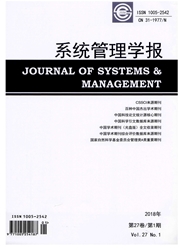

 中文摘要:
中文摘要:
针对许多行业生产过程的随机产出特征,重点研究随机产出风险下的供应链协调问题。假定供应商对零售商的实际发货是其订货量的随机比例,零售商面临的需求是价格依赖的。讨论了随机产出背景下的集中决策与分散决策模型,并进一步分析分散决策情形下随机产出的均值对供应商定价决策、零售商订货决策、供应链各方及整体利润的影响,分析表明,随着随机产出均值水平的提高,供应商的批发价格随之降低,零售商的最优订货量先增加后减少,供应链各方以及整体利润都随之增加。分别讨论了当存在随机产出风险时,收益共享、线性补偿金两种机制在协调供应链运作方面的有效性,结果表明,此时线性补偿金机制不能有效协调供应链运作,而收益共享机制能真正提升供应链各方及整体利润。
 英文摘要:
英文摘要:
The problem of supply chain coordination with risk of random yield is studied. We assumed that the retailer only receives a random fraction of its order from the supplier and faces to price-dependentdemand. First, the centralized and decentralized decision model under random yield risk is proposed, and the impacts of the mean of random yield on pricing decisions of the supplier, ordering decision of theretailer and the overall profits of the supply chain or each party in the chain, is analyzed. The analysis show that the supplier's wholesale price decreases as the mean of random yield, the retailer's optimal orderquantity increases first and then decreases, both of the profits of each party and whole supply chain increase. Then, the effect of revenue sharing and linear compensation on coordinating supply chain isdiscussed. The results show that linear compensation cannot effectively coordinate supply chain with risk of random yield, while revenue sharing mechanism does really enhance the overall profit of supply chain oreach party.
 同期刊论文项目
同期刊论文项目
 同项目期刊论文
同项目期刊论文
 New parametric prioritization methods for an analytical hierarchy process based on a pairwise compar
New parametric prioritization methods for an analytical hierarchy process based on a pairwise compar 期刊信息
期刊信息
